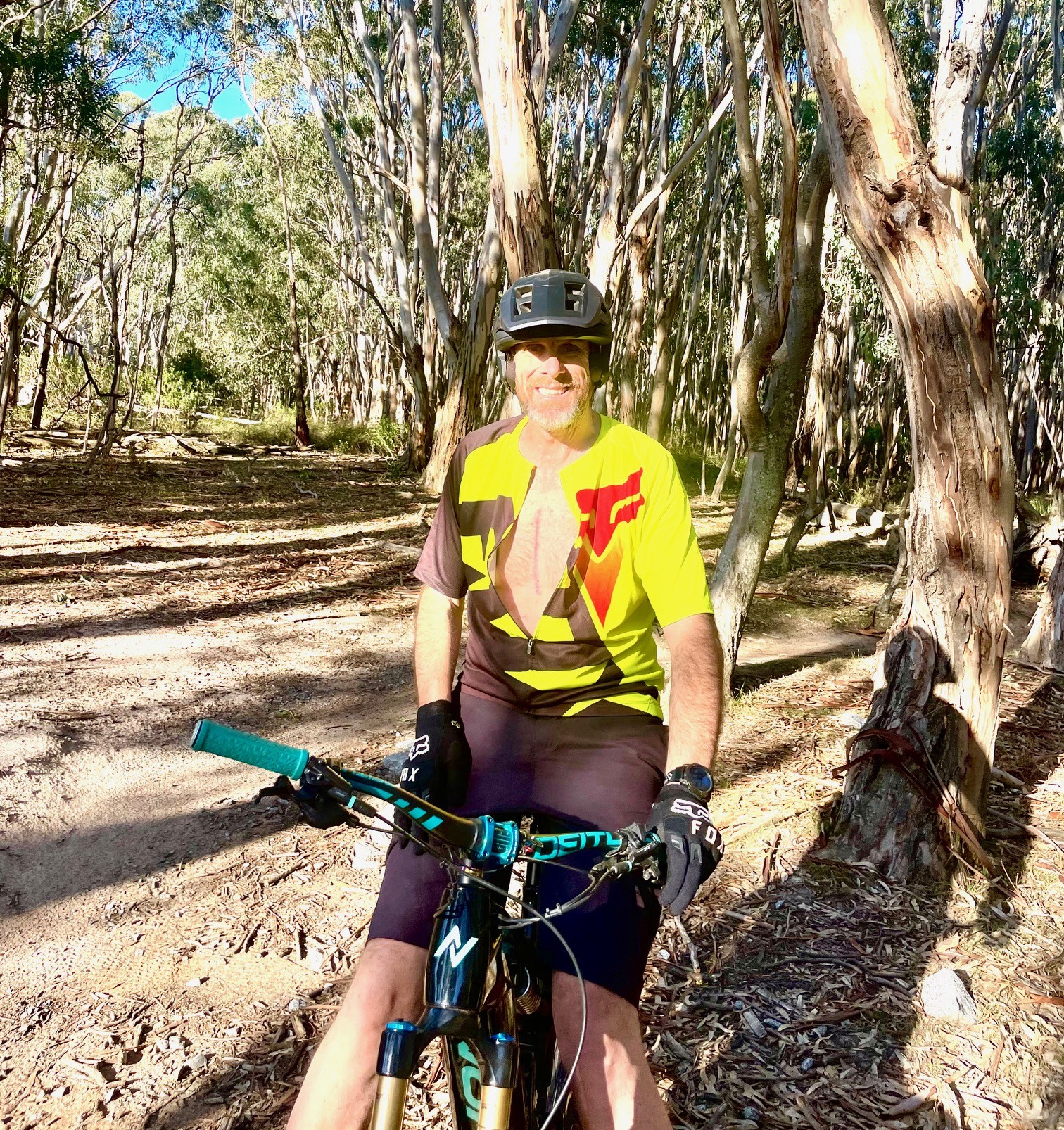
Being physically active and strong has been a constant in Alex McKenzie’s life. At 6 foot 10, he is built for it, with bodybuilding one of his many athletic pursuits. So, imagine how he felt not being able to lift a 1 kg weight.
One minute you’re mowing the lawn, the next you’re being told you need open-heart surgery
It was an ordinary day when Alex McKenzie’s life took an unexpected turn. While mowing the lawn, racing to beat the rubbish truck, Alex found himself unable to catch his breath. ‘I went down on one knee and thought, “I can’t breathe,”‘ Alex recalls.
He drove himself to the Victorian Heart Hospital and was told he had experienced a serious heart episode. Tests revealed concerns with Alex’s heart, including a severely leaky mitral valve.
Did a fit life save Alex from a dodgy ticker?
Athletic endeavours have weaved throughout Alex’s life. Growing up, he found refuge in basketball. By the time he was 17, Alex was already about 6 foot 10, and a local basketball coach guided him into the sport at a competitive level. His talent and height quickly propelled him into the state team, and stints with the NBL’s Hobart Devils and the Devonport TCU Warriors.
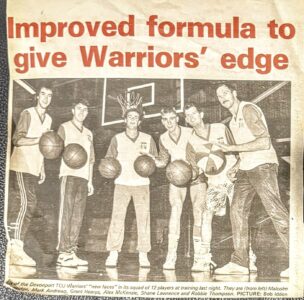
Alex (fourth from left) with some of his Devonport TCU Warriors team members
When recurring shoulder dislocations proved irreparable despite multiple surgeries, Alex’s athletic career pivoted to semi-professional football, playing for Oakleigh, Hampton, and Sandringham in Victoria.
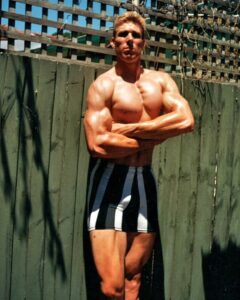
Alex in his bodybuilding days
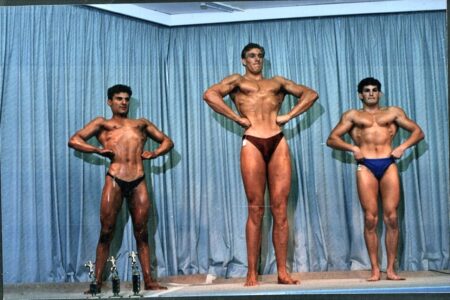
Even now in his fifties, Alex is a keen mountain bike rider.
The severe heart episode while mowing his lawn was the start of a journey for Alex, who has always avoided cigarettes, alcohol, coffee and junk food.
In March of this year, Alex underwent open-heart surgery to repair his mitral valve.
Surviving open-heart surgery
The surgery was difficult, hampered by complications from other issues with his heart. ‘I went into a coma for a week, and it was pretty scary.’ He would later be told by his treating team that he was ‘tubed up’ in the Cardiac Intensive Care Unit (ICU) for 10 days.
But they see him as a survivor, and despite struggling through the surgery, he came out the other side.
About six weeks post-surgery, when Alex was ready, he commenced cardiac rehabilitation.
Starting from scratch in cardiac rehab
Cardiac rehabilitation is a supervised program designed to improve cardiovascular health for individuals who have experienced heart-related issues such as heart attacks, heart failure, or surgeries. This comprehensive program combines exercise, education, and support to help patients recover and strengthen their hearts. The goal is to improve functional mobility, manage risk factors, and address the psychosocial effects related to heart conditions.
At the Victorian Heart Hospital, the Cardiac Prevention and Rehabilitation team plays a crucial role in helping patients make long-term lifestyle changes. The program is personalised to each patient’s needs and includes a combination of exercise, education, and support led by a team of more than 20 health professionals.
‘We take a holistic approach,’ said Shihoko Pearson, Cardiac Prevention and Rehabilitation Clinical Lead. ‘We are a multidisciplinary team that manages every aspect of their care.’
The team includes nurses, dietitians, physiotherapists, exercise physiologists, pharmacists, social workers, and cardiologists.
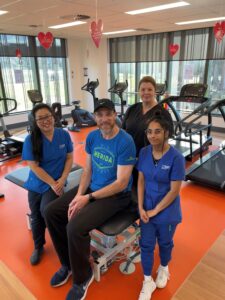
Alex with some members of his multidisciplinary cardiac rehab team at the Victorian Heart Hospital
‘People who go to cardiac rehab are more likely to take their medication, control their risk factors better, and enjoy more productive lives,’ says Professor Stephen Nicholls, Program Director at the Victorian Heart Hospital.
Patients like Alex McKenzie have found the program to be life-changing. After undergoing open-heart surgery, Alex participated in an 11-week rehab program at the Victorian Heart Hospital. This is longer than the 4- or 8-week program attended by most patients, due to his needs.
‘I cried in my first rehab session because I couldn’t lift one-kilo dumbbells. I used to be a bodybuilder, and I felt so weak, so broken, so frail,’ Alex shares. However, with determination and support from the rehab team, Alex progressed to easily lifting 8-kilo dumbbells and is now back to mountain biking.
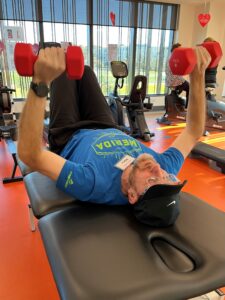
Alex lifting weights at one of his cardiac rehab sessions
Cardiac rehab not only helps patients recover physically but also provides emotional and psychological support. The program includes education on heart-healthy living, stress management, and counselling to help patients navigate the challenges of living with a heart condition. ‘Cardiac rehab programs in Australia are vital and underfunded, and I’m advocating for more support,’ Alex added, highlighting the importance of continued investment in these life-saving programs.
Still on his journey
Although the surgery to repair his mitral valve has succeeded, which means his leak is now considered slight, other cardiac issues continue for Alex and he has recently been assigned to the heart failure program and may need a pacemaker.
‘The world of heart failure management is rapidly advancing. 20 years ago, someone like Alex would have been staring down the barrel of a heart transplant, but now we have a vast array of medical options.’ says Dr Sriram Rao, cardiologist and Deputy Director of Monash Health’s Heart Failure Services.
‘It’s a bit scary,’ says Alex, ‘but the Hospital is doing everything they can to help.’
Alex is also hoping to participate in a clinical trial for a medication that could mean a potential cure for his condition. ‘I’m doing it to give back to the hospital. Even if I don’t get the serum, I might be able to help humanity,’ he adds.
Patients like Alex currently need to take upwards of 8 tablets a day to manage his heart failure. The BALANCE trial, for which the Victorian Heart Hospital Clinical Trial Centre is the lead site Australia-wide, is trialling a world-first intravenous therapy for heart failure that aims to assess whether this drug can halt the progression of heart deterioration and potentially reverse damage to the heart muscle. If successful, this is a first step towards a world where patients can have regular injections rather than all those tablets.
Supporting others facing similar challenges
Throughout his journey, Alex has found ways to give back. He recalls an encounter with a man who was visibly upset after being told he needed open-heart surgery. ‘I lifted my shirt, showed him my scar, and said, “I just had that surgery earlier this year, and it’s not as bad as you might think. Just don’t get too much on Google,” and had a good chat with him,’ Alex says. He hopes to continue supporting others facing similar challenges.
Alex is full of praise for his cardiologists and the team in cardiac rehabilitation who, he says, have become friends.
‘While I was in ICU, Professor [Jayme] Bennetts sat with me, checking up on me every day – he is my hero. When I see him walking around the hospital or having a coffee after a surgery still gowned up, it’s like being a kid and seeing your favourite footy player, except better.’
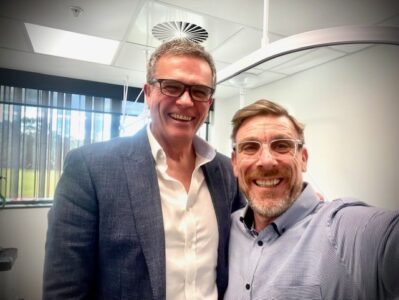
Alex with his surgeon and Director of Cardiothoracic Surgery at the Victorian Heart Hospital, Professor Jayme Bennetts
‘My cardiologist Professor [Nitesh] Nerlekar treats you like a friend, not a patient. It’s not just a job to him,’ says Alex.
Alex and his wife are planning a fundraiser to buy three beds for the Victorian Heart Hospital, which will accommodate patients who are more than 200 centimetres tall.
As Alex continues his journey, he says, ‘I’m very grateful for the care I’ve received, and I’m sure I can still help the hospital in some way.’
Alex’s story is one of resilience. While there is still a road to travel for Alex, having not received the news he hoped to, he continues with humility and an ambition to help others through their own journeys undergoing open-heart surgery.
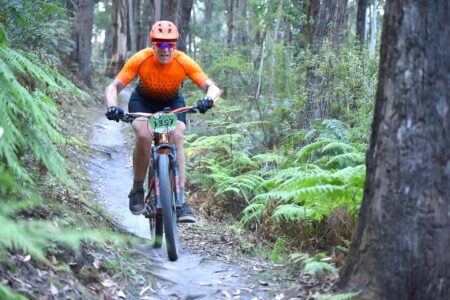
Alex trail riding in Melbourne’s outer eastern ranges
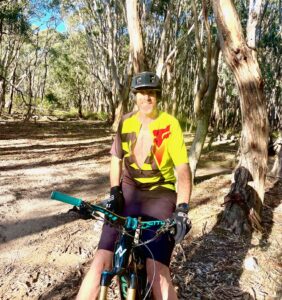
With encouragement from his cardiologist, Alex has returned to riding the rail trails around Lilydale and Warburton


